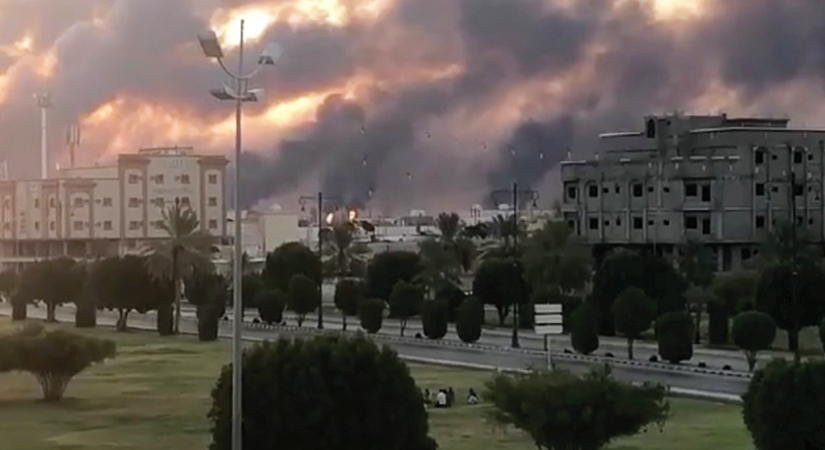By Victor V. Saulon, September 17 2019; Business World
https://www.bworldonline.com/energy-dept-taking-stock-of-saudi-oil-attacks-impact/
Image Credit to Reuters
THE DEPARTMENT of Energy (DoE) on Monday downplayed the impact of the attack on Saudi Arabia’s oil production sites on Saturday, saying it was “premature” to speculate on its effect on local petroleum prices even as television reports quoted department and industry sources as projecting a potential P3-5 hike in pump prices.
However, the department said it was meeting with local oil companies this week and that it had convened an emergency meeting on Sunday after the attack on the facilities of Saudi Arabian Oil Co. (Aramco).
“We are seeking to ensure that the energy family will be sufficiently prepared to face the potential impact of this unfortunate incident, if any, on the country,” Energy Secretary Alfonso G. Cusi said in a statement.
The DoE was reacting to the attack by explosive-laden drones on Aramco’s crude processing plants, setting them on fire. The incident is estimated to have halved Saudi Arabia’s production — reducing it by 5.7 million barrels per day — and clipped world supply by five percent. The US is blaming Iran for the strike on the world’s biggest crude producer, with US President Donald Trump tweeting that the superpower was “locked and loaded” to deliver a response.
Bloomberg reported that Brent oil posted its biggest ever intraday jump to more than $71 a barrel before paring gains.
“It is premature at this moment to say that the Saudi Aramco incident would have an adverse impact on the country. The DoE is closely monitoring developments in the international markets until the last trading day on Friday to fully assess any impact on the prices,” Mr. Cusi said.
In an online message sent to reporters, the DoE said Mr. Cusi had directed a meeting this week with oil companies “to look into the sufficiency of inventory levels.”
“The impact on prices, if any, may be felt by Tuesday next week; that is, if there will indeed be an adverse impact. To date, the DoE reiterates that [estimating] the impact of the incident is still premature.”
The emergency meeting on Sunday afternoon was attended by representatives of the DoE’s Electric Power Industry Management Bureau and Oil Industry Management Bureau, as well as of the National Electrification Administration, National Power Corp., Philippine National Oil Co. (PNOC) and PNOC Exploration Corp.
“Rest assured that the DoE, together with the entire energy family, is closely monitoring the situation and will keep the public properly informed of developments on the matter,” the department said.
Petron Corp., the country’s biggest oil company, said that it does not expect any immediate supply disruption after the attack, even as it “regrets the recent attacks made on Saudi Aramco’s refinery facilities, affecting oil output on an international scale.”
“We wish to assure the public that there will be no supply disruption from our end. We have adequate supply to support our domestic requirements,” it said in a statement.
“Meanwhile, we are closely monitoring the situation and hoping that normalcy will be restored soon.”
Separately, Senator Sherwin T. Gatchalian said the surge of global oil prices as a result of the drone strike underscores the need for the DoE to put energy security at the forefront of its energy direction by diversifying the country’s oil supplier portfolio.
“Doing so would insulate consumers from price volatility,” Mr. Gatchalian said.
“Unforeseen external disruptions on the oil supply chain, such as what happened in Saudi Arabia, can create massive disruptions in our local transportation and power sector. In fact, the Philippines had been importing 33.7% of its crude oil from Saudi Arabia as of 2018, making [it] the top supplier of crude oil in the country.”
Mr. Gatchalian, who heads the Senate’s energy committee, said the DoE and local oil industry suppliers should formulate a contingency plan to replace Saudi oil in the short term until supply from that country normalizes.
He said the department should also ensure that oil companies and refiners are complying with the required minimum inventory of 15 days and 30 days, respectively, to cushion the impact of this disruption. — Victor V. Saulon

